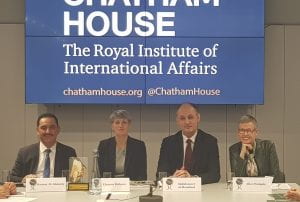Iraqi cultural heritage – a national view
By Nahrein Network, on 7 January 2020

Panellists at the Chatham House round-table on the role of cultural heritage in the reconstruction of Iraq, 3 October 2019
On 3 October 2019, The Nahrein Network organised a round-table discussion on the role of cultural heritage in the reconstruction of, as part of Chatham House Iraq Initiative’s conference, Iraq in Transition.
Dr Abdulameer al Hamdani, Iraq’s Minister of Culture, gave his vision of the role of heritage in Iraq’s future.
The Ministry of Culture has 15,000 employees working across Iraq. The Ministry is responsible for diverse fields of culture, including cinema, fashion, theatre and antiquities.
Cultural heritage could be a unifying force in the country, used as a tool to unite people. It can be used to respect minorities, indigenous minorities – all communities, but ultimately, we are looking for a national identity.
Heritage can be used for peacebuilding and peacemaking. Wars did not help us to focus on these priorities.
We need to avoid another Halabja. We need to open a dialogue with each other. Excavations in Iraq attest to this shared history.
Heritage can be used as a tool for unification.
Culture and heritage will determine the future of Iraq.
Culture is key. SBAH is encouraging Iraqi universities to work on excavations and of course also international excavations. We have 60 expeditions in the country.
Since the 1980s, the previous regime and dictatorship, Iraq has been isolated. We are now back to normal in terms of field work and excavations. A few month months ago we were able to inscribe Babylon as a World Heritage Site, working closely with UNESCO to do this. Given this energy, we are working now to inscribe 12 new sites, including the Yezidi site of Lalish. This shows the Iraqi Government does care about minorities in the country.
There is increasing interest in heritage in Iraq and from the international side.
We believe heritage in Iraq is a global heritage and SBAH is responsible for that. We need to focus on cultural diversity.
The international community is helping us, standing with us.
Looters in 2003 said that heritage artefacts belonged to Saddam or were non-Islamic. But I worked with the Shia Clergy to put a stop to this looting. An edict and amnesty helped return 30,000 looted artefacts.
Our museums are open, which shows that Baghdad is a normal city.
We are organising the first international conference on cultural heritage, planned for April 2020, to share knowledge and unify the country. We hope to see 300/400 participants in this conference.
The purpose of the conference is to think about whether it is just stones we are looking at, or is it more?
We will build a new cultural complex, a new museum. The current one will be used as an Islamic civilisation museum.
SBAH has experience with international institutions since the 1950s.
We are open to dialogue, to discussions about how we can use heritage for peace and development.
We consider the country’s communities as natural heritage, organic to the country.
This summary of Dr Al-Hamdani’s words was compiled by Dr Mehiyar Kathem.
- Read a summary of Professor Kossay Al-Ahmedy’s presentation
- Read Alice Walpole’s presentation
This event is part of a project funded by a UCL Public Policy Expert Engagement grant.
 Close
Close


